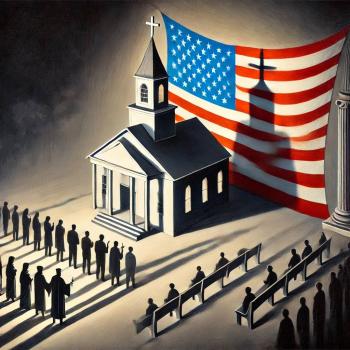
Three different points of view yield the same conclusion: Christian nationalism cannot exist.
So, why does it?
Pope Francis once said, “When a Christian becomes a disciple of ideology, he has lost the faith….” Minister and author Johnathan Leeman insists, “There is no such thing as a ‘Christian nation’ in a Baptistic understanding since the membership borders of the nation and the church will not overlap.” And the writer in me recognizes an oxymoron when I see one.
The Oxford Languages dictionary defines “Christian nationalism” as “identification with one’s own nation and support for its interests, especially to the exclusion or detriment of the interests of other nations.” Britannica calls nationalism an “ideology based on the premise that the individual’s loyalty and devotion to the nation-state surpass other individual or group interests.”
Christian nationalism cannot exist, but it does. And it’s an oxymoron because you cannot make Christ paramount in your life, as the Bible commands, while also allowing your “loyalty and devotion to the nation-state surpass other individual or group interests.”
- The words “Christian nationalism,” “Christian nationalist” and “Christian nation” do not meet biblical faith requirements for Christians, as Pope Francis noted.
- The words ignore the fact that nations and churches never completely overlap, as Johnathan Leeman said.
- And they ignore the fact that Christianity and nationalism cannot both be people’s top priority. It’s one or the other or something else entirely.
Keep in mind that Christian nationalism is a danger to your soul and your physical well-being. The best-known examples of nationalism that erupted into wars are the Boxer Rebellion in China, Major General Horatio Kitchener’s conquest of the Egyptian Sudan, and both world wars.
Christian Nationalist Beliefs
Let’s set aside semantics associated with Christian nationalism for a moment and accept that the movement does exist under that name.
American followers of Christian nationalism believe the U.S:
- Was founded on the Christian faith
- Is still a Christian nation
- Should remain Christian into the future
Yet, how can the U.S. call itself a “Christian nation” when it:
- Was founded on religious freedom rather than Christianity
- Enslaved blacks, confiscated Native Americans’ homelands wherever whites wanted the land, imprisoned Japanese citizens during World War II, and today, seeks to eject immigrants
- Pretends to be something it never was, i.e., Christian
- Is winning the propaganda war.
According to Brad Onishi, a former evangelical minister and self-identified Christian nationalist, Christian nationalists also believe:
- U.S. laws should reflect Christian values. (They probably do for the most part.)
- True Americans should be Christian. (They aren’t.)
- The federal government should legally establish Christianity as the state religion. (It opens a pandora’s box if the government does.
Dangers of Established Religions
“An established religion is one that enjoys the patronage of the state; its doctrine and practices receive the endorsement of the state; its clergy and members receive certain advantages from the state, if in no other way than the fact that their tax dollars function simultaneously as offering-plate dollars; and any changes to its doctrine and practice of the religion require the consent of the state,” according to minister and author Leeman.
He warns that establishing Christianity as the state church risks “communicating something you don’t mean to communicate – that you believe in an established church. That’s undoubtedly what non-Christian critics are hearing.”
Leeman also warns that establishing a state religion may produce good moral behavior in the short term, but it doesn’t do so in the long term. And it does an even “worse job of generating true religion,” he says in citing examples in Europe.
Not All Americans Are Christians
Pastor Leeman explained “.…to call on the governments of nations today to enforce Christian doctrine about who God is, or to formally identify a nation itself as Christian (as Christian nationalism does) is to claim that God intends for government to exercise a priestly function.”
God made a covenant with ancient Israel, as described in the Bible. And he eventually made a new covenant with his people, i.e., Christians through Christ. Yet, many right-wing U.S. Christians insist that God made a covenant with the American nation.
Christian nationalism cannot exist, but it does.
Exactly who arranged the covenant with God on the human side, as Moses did for ancient Israelites. When did it happen? Why wasn’t it announced to the world with great fanfare? Where does that leave Christians who aren’t Americans? Will their faith be for naught?
If such a covenant existed would you include the late Madalyn Murray O’Hair in it. She was the famous atheist whose lawsuit resulted in a ban on mandatory prayers and Bible readings in public schools. What about comedian Bill Maher or Nobel Laureate Linus Pauling? All three are/were Americans, and all three are/were well-known atheists.
The point is that Christians aren’t necessarily Americans, and Americans aren’t necessarily Christians. Christians may be anyone anywhere in the world, and Americans may include non-Christians — Jews, Muslims, Hindus, Buddhists, and followers of various other religions, along with atheists and agnostics.
An “Explicit Covenant”?
Despite all of this, the Christian Broadcasting Network (CBN) has declared that America has an “explicit covenant” with God/Christ in which Americans “pledged to save the world or lose it.”
CBN explained that the American nation’s earliest settlers made the covenant and promised to proclaim God throughout the earth. Oops! This statement neglects to mention that the nation’s earliest settlers may have crossed a land bridge from modern-day Russia to modern-day Alaska and brought their native religions with them. But they did not arrive on the Mayflower or some such ship from Europe.
Perhaps CBN meant that a handful of early white settlers made a covenant with God, but that nation wasn’t America. Native Americans didn’t share the Christian faith, nor did newcomers from the Middle East, who may have brought Judaism or Islam to the U.S., or the Far East, who may have brought Buddhism or the Shinto religion.
A Distortion of American History
Now, we come to another distortion of truth: Christian nationalists’ misunderstanding of American history. They present the founding fathers as a monolithic group despite these men being fairly diverse.
They were not solidly Christian, and even founders who identified as Christian weren’t “Christian” in the way 21st century Americans understand the term.
The founding fathers used “Christian” to mean “a system of moral teachings and not orthodox biblical Christianity,” according to Dr. Gregg Frazer, professor of history and political studies at The Master’s University in Santa Clarita, CA.
These men represented various schools of thought. Some identified as Christian, while others embraced non-Christian beliefs such as deism or rational theism. But they did agree about separation of church and state.
They “did not intend to create a Christian nation,” Frazer said.
The founding fathers weren’t far removed from ancestors who had left Europe to escape oppressive state churches that they were forced to financially support. They most certainly did not want to replicate that situation in the new nation they were establishing.
Consequently, they produced a decidedly secular constitution and Bill of Rights that made no mention of God, Christ or Christianity. Instead, the first statement in the Bill of Right says, “Congress shall make no law respecting an establishment of religion or prohibiting the free exercise thereof.”
That’s all it says about religion.
An Even Worse Misrepresentation
Leeman has plenty to say about Christian nationalism’s misrepresentation of Christ and Christianity. “When you ask the state to undertake the role of the church by rendering judgment on right doctrine, you subtly undermine new covenant, Holy Spirit-birthed Christianity,” he said.
“When we ‘gather in his name’ and ‘baptize in his name’ with the keys of the kingdom in hand (Matt.16:19; 18:18-20; 28:19). When the state establishes a church and names itself ‘Christian,’ it participates in that nametag-pinning and sign-hanging work.
“Just Say No”
“It (the state) has usurped the keys and acted as a church. It has named people as Christians who are not Christian. Leeman said we should say no to Christian nationalism for several reasons.
However, one of the most compelling arguments is that God identified himself with the children of Abraham and the nation of Israel in the Old Testament. When they worshipped other gods (remember their golden calf?), they defiled God’s name.
God sent the Israelites into exile and eventually promised a new covenant. The new covenant meant that God no longer tied his name to a nation. He ties it to his Son.
A “Christian” Nation of Non-Christians
“This is what so many Christians seem to miss in the whole Christian nationalism conversation,” Leeman said. “As Christians, do we really want to identify a nation filled with non-Christians as ‘Christian’?”
Do we want to agree that Christian nationalism cannot exist? Or should we go along with the lies from the radical right?
Leeman insists that “insofar as the new covenant identified true religion only with the Holy Spirit indwelt believes, new covenant religion – aka, Christianity – cannot be identified with a nation, unless they’re all born again. There is no such thing as a ‘Christian nation’ in a baptistic understanding since the membership borders of the nation and the church will not overlap.
“Christian Europe was never Christian….” he said. And following Leeman’s logic, there has never been or never will be a “Christian U.S.” or “Christian America.”
Now What?
The truth doesn’t necessarily reflect today’s propaganda. Where does it leave us? Probably exactly where we are.
People who call themselves Christian nationalists throw words around with little respect for the truth and will continue to do so. The rest of us may feel contemptuous, but we cannot stop them. Can we?













